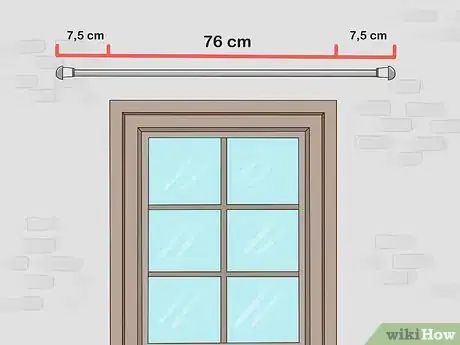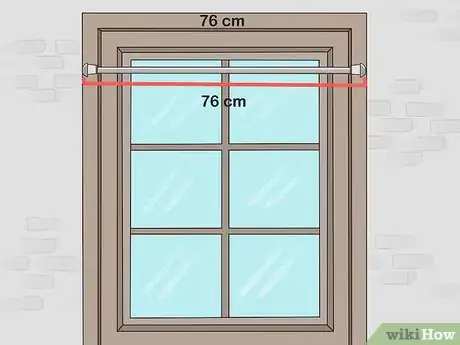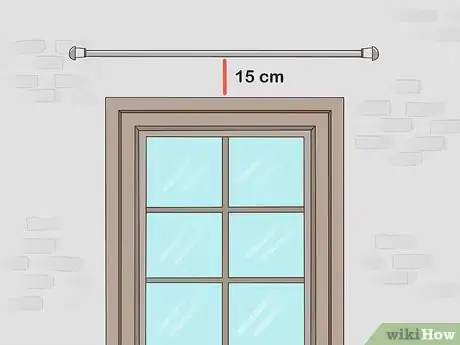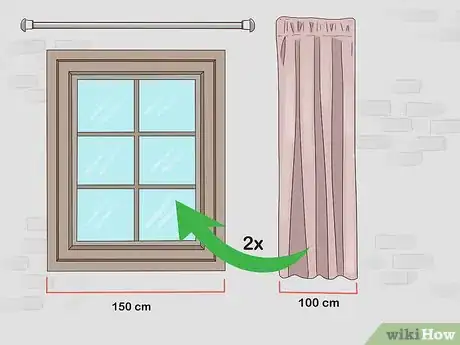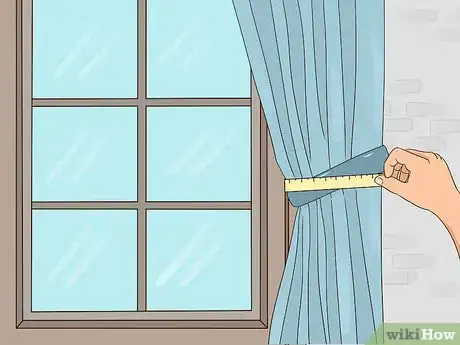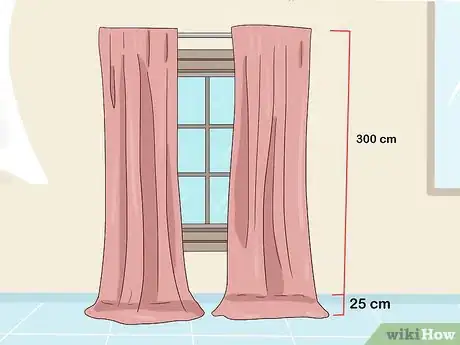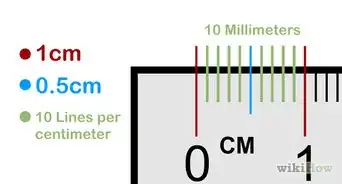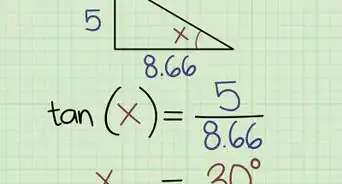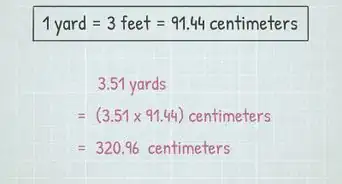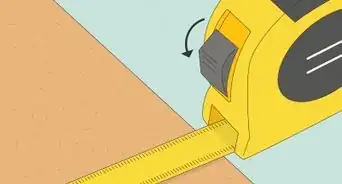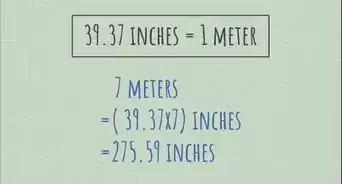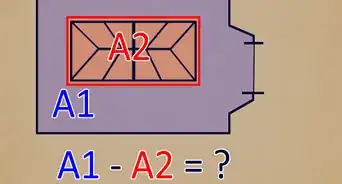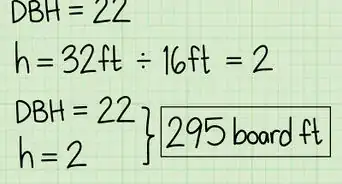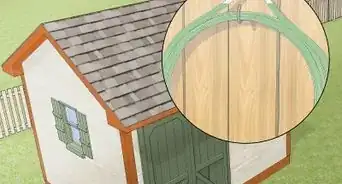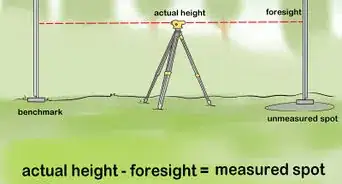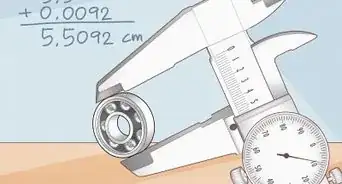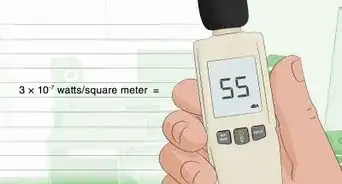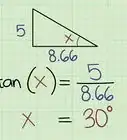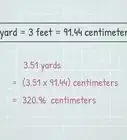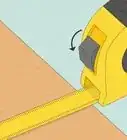This article was co-authored by Angelica Savard. Angelica Savard is a Home Stager, Realtor, and Interior Designer based in Long Beach, California. She is also the Co-owner of Elegant Domain Interiors LLC, a business that offers design consulting, home staging, and window treatments. She has over 15 years of interior design and consulting experience. She earned a BA from California State University Long Beach with an emphasis on Interior Architectural Design.
There are 8 references cited in this article, which can be found at the bottom of the page.
This article has been viewed 70,309 times.
Measuring for curtains can be confusing if you've never done it before. However, all you need is a measuring tape and a calculator to figure out the right curtain length and width. Figure out some basic measurements as a starting point and then add or subtract depending on your specific needs.[1] When you're done, you can custom order the right curtains for your windows.
Steps
Measuring for Rods
-
1
-
2Add 3 inches (7.6 cm) to each side for a rod above the trim mount. After you measure the width of the window, add 3 inches (7.6 cm) to both sides. This will give you a general sense of the length of the rod you need if you're keeping it just above the curtains, which is the most common style.[4]
- For example, say your window's width was 30 inches (76 cm). Add 6 inches (15 cm) to get the rod size of 36 inches (91 cm).
Advertisement -
3Use the exact window width if your rod is inside the trim mount. Rods kept inside the trim mount give a very streamlined, practical style. The rod will be the same length as the width of the window.[5]
- For example, if window's width was 30 inches (76 cm), your rod's length would also be 30 inches (76 cm).
-
4Add 3 inches (7.6 cm) to 5 inches (13 cm) for a rod below the trim. A rod kept below the trim mount can help show off decorative window frames and molds. Rods positioned below the trim mount are generally 3 inches (7.6 cm) to 5 inches (13 cm) longer than the width of the window. This helps provide full coverage, even with the top of the window exposed.[6]
- For example, say your window's width is 30 inches (76 cm). For a below trim rod, your rod should be 33 inches (84 cm).
Taking Basic Curtain Measurements
-
1Determine rod placement. Decide if your rod is going to be at the frame, below the frame, or above the frame.[7] If you're placing the rod below or above the frame, determine precisely how many inches or centimeters off-center the rod will be.[8]
- For longer curtains, the rod will probably be higher above the window. Rods can be placed anywhere from 6 inches (15 cm) to 12 inches (30 cm) above the window frame.
- It can help to make a light mark on the wall to determine where your rod will fall.
-
2Measure your window's length. Measure your window from the top of the windowsill to the bottom.[9] Then, add any additional measurements based on rod placement for a rough window length. Later, you'll need to tweak this measurement as you determine curtain type.[10]
- For example, say the length of the window is 40 inches (100 cm). You want your curtain rod a little higher than the frame, so add 6 inches (15 cm) to this to get a length of 46 inches (120 cm).
-
3Measure the basic width. The basic width is found by measuring the window from one pane to another. This rough measurement gives you a good starting point. You should slightly tweak the measurement based on which curtain type you choose.[11]
-
4Calculate your width based on curtain type. Your width is affected by the type of curtains you purchase. The following are general rules of thumb to calculate width depending on the curtain type:[12]
- Double the width for pencil pleated windows.
- Multiply the width by two for eyelet windows.
- Multiply the width by 1.5 for tab top windows.
-
5Calculate your precise curtain length.[13] After you've figured out the length of your window, make sure you're positive about where you want your curtains to fall. Sill length curtains usually fall .5 inches (1.3 cm) above the windowsill. Below sill length curtains usually fall about 6 inches (15 cm) below the windowsill. Floor length curtains usually fall about .5 inches (1.3 cm) above the floor.[14] Also, account for the placement of the rod.
- For example, say you want below sill curtains. Your window is 100 inches (250 cm) and the rod will be 6 inches (15 cm) above the frame. Add 12 inches (30 cm) to 100 inches (250 cm). Your curtain length should be 106 inches (270 cm).
-
6Decide how many panels to order. Windows generally have at least two panels. Check the average width of panels in your preferred style. This helps determine how many panels you need.[15]
- For example, say your pencil pleated panel is usually sold with a width of 40 inches (100 cm). If your window's width is 60 inches (150 cm), you need to order two panels.
Making Adjustments for Special Features
-
1Measure for tie-backs. If you want tie-backs, which are ropes used to hold the curtains back, you will need to measure for them once your curtains come in. To measure for tie-backs, wrap a measuring tape around your curtains. Adjust the measuring tape until the curtain is gathered loosely in the tape without being pinched or folded. Record the measurement to figure out the length of your tie-back.[16]
-
2Account for puddling. If your curtains are mostly for show, you can measure to have them puddle slightly on the floor. Measure the distance between the bottom of the window frame and the floor. Add this measurement to the total curtain length. This adds a small amount of puddling. If you want more dramatic puddling, you can add on a few more inches or centimeters.[17]
- A 5 to 8 inches (13 to 20 cm) puddle will fan slightly across the floor. For a more dramatic puddle, you can add 10 inches (25 cm) or more to your total curtain length.
- Functional curtains, which are going to be opened and closed frequently, should not have puddling.
-
3Add layering. If you want a layered look, you can get two different curtains fitted for the proper width for your window. You will then need to install a double rod so the curtains can overlap.[18]
-
4Measure for a window valance. A valance covers the top third or fourth of a window. To measure for a valance, measure the width of the window from the inside left of the frame to the inside right of the frame. Then, to measure length, measure downward from the inside top frame to where you want the valance to fall on the window. From there, multiply the width depending on your curtain type.[19]
- For example, for a pencil pleated window valance, double the width.
-
5Consult with a professional. It's always a good idea to seek consultation with a professional before finalizing your order. Talk to someone working at the establishment where you're buying your curtains. Ask them to double check that the measurements you took are accurate before placing your order.
Expert Q&A
Did you know you can get expert answers for this article?
Unlock expert answers by supporting wikiHow
-
QuestionHow high should I hang my curtains above my windows?
 Angelica SavardAngelica Savard is a Home Stager, Realtor, and Interior Designer based in Long Beach, California. She is also the Co-owner of Elegant Domain Interiors LLC, a business that offers design consulting, home staging, and window treatments. She has over 15 years of interior design and consulting experience. She earned a BA from California State University Long Beach with an emphasis on Interior Architectural Design.
Angelica SavardAngelica Savard is a Home Stager, Realtor, and Interior Designer based in Long Beach, California. She is also the Co-owner of Elegant Domain Interiors LLC, a business that offers design consulting, home staging, and window treatments. She has over 15 years of interior design and consulting experience. She earned a BA from California State University Long Beach with an emphasis on Interior Architectural Design.
Home Stager, Realtor, & Interior Designer Hanging your curtains starting at the ceiling can give your space a more dramatic look and will also appear to raise the ceiling height. This is a current trend in interior design at the moment, but sometimes it might look funny depending on the architecture of the room. If the ceiling height does not work for your space, you can also hang them halfway between the top of the window molding and the ceiling height.
Hanging your curtains starting at the ceiling can give your space a more dramatic look and will also appear to raise the ceiling height. This is a current trend in interior design at the moment, but sometimes it might look funny depending on the architecture of the room. If the ceiling height does not work for your space, you can also hang them halfway between the top of the window molding and the ceiling height. -
QuestionIf a panel is 50 x 63, is that W x H or H x W?
 Richard BurnisdeCommunity AnswerUsually curtains on a packet are quoted width then drop. Within the packet of ready made curtains they would be sold with 2 panels measuring the size stated on the packed. So 50 x 63 would be for that size, it would allow for 2 panels to allow for the curtains to be pleated when hung on that track.
Richard BurnisdeCommunity AnswerUsually curtains on a packet are quoted width then drop. Within the packet of ready made curtains they would be sold with 2 panels measuring the size stated on the packed. So 50 x 63 would be for that size, it would allow for 2 panels to allow for the curtains to be pleated when hung on that track. -
QuestionThe width is 8 feet and the length 7 feet. What size curtains should I get?
 Richard BurnisdeCommunity AnswerIn metric for ease, 8ft = circa 243 cm wide x 213 cm for ready-made curtains, you will find the nearest size as they are sold by track width. Ready-made curtains have 2x panels measuring the size given. So you get a pleated effect. When choosing curtains with a pencil pleat heading, ideally 2x the track width is required for fullness. With eyelets, as little as 1.5x will do but it is better with 2x. Thus, for a width 243 cm, the nearest stock size will be 228 cm. This is 93 percent full, so 1.93 nearly 2x so these would be fine on the width. Height 213 cm, the nearest size would be 228 cm, so you would need to raise your track or pole up to allow for this.
Richard BurnisdeCommunity AnswerIn metric for ease, 8ft = circa 243 cm wide x 213 cm for ready-made curtains, you will find the nearest size as they are sold by track width. Ready-made curtains have 2x panels measuring the size given. So you get a pleated effect. When choosing curtains with a pencil pleat heading, ideally 2x the track width is required for fullness. With eyelets, as little as 1.5x will do but it is better with 2x. Thus, for a width 243 cm, the nearest stock size will be 228 cm. This is 93 percent full, so 1.93 nearly 2x so these would be fine on the width. Height 213 cm, the nearest size would be 228 cm, so you would need to raise your track or pole up to allow for this.
References
- ↑ Angelica Savard. Home Stager, Realtor, & Interior Designer. Expert Interview. 30 April 2020.
- ↑ Angelica Savard. Home Stager, Realtor, & Interior Designer. Expert Interview. 30 April 2020.
- ↑ https://dengarden.com/interior-design/How-to-Measure-for-Curtains
- ↑ https://dengarden.com/interior-design/How-to-Measure-for-Curtains
- ↑ https://www.overstock.com/guides/how-to-measure-for-curtains
- ↑ https://www.overstock.com/guides/how-to-measure-for-curtains
- ↑ Angelica Savard. Home Stager, Realtor, & Interior Designer. Expert Interview. 30 April 2020.
- ↑ https://www.overstock.com/guides/how-to-measure-for-curtains
- ↑ Angelica Savard. Home Stager, Realtor, & Interior Designer. Expert Interview. 30 April 2020.
- ↑ https://dengarden.com/interior-design/How-to-Measure-for-Curtains
- ↑ https://dengarden.com/interior-design/How-to-Measure-for-Curtains
- ↑ https://dengarden.com/interior-design/How-to-Measure-for-Curtains
- ↑ Angelica Savard. Home Stager, Realtor, & Interior Designer. Expert Interview. 30 April 2020.
- ↑ http://www.dunelm.com/info/buying-guides/how-to-measure-for-curtains
- ↑ https://www.curtainshop.com/pages/how-to-measure-for-curtains
- ↑ http://www.drapesmadeeasy.com/drapery-tie-backs.html
- ↑ https://images.restorationhardware.com/content/catalog/product/pdfs/RH_Drapery_Window_Hardware.pdf
- ↑ https://images.restorationhardware.com/content/catalog/product/pdfs/RH_Drapery_Window_Hardware.pdf
- ↑ https://www.hunker.com/13413709/how-to-measure-for-a-window-valance
About This Article
To measure the width of your curtains, measure from the edge of one window pane to another. Next, calculate the width for your curtains by doubling the width for pencil pleated windows or multiplying by 1.5 for tab top windows. To measure the length, measure from the top of the windowsill to the bottom and don’t forget to add on 6 to 12 inches depending on how far above the frame you want your rod to be. To measure how long your rod should be, measure from the outer end of the window’s frame on one side to the other. If you’re measuring for a rod above the trim mount, add 3 inches to each side. For more tips, including how to make adjustments in your measurements if you want to tie your curtains back or have them puddle on the ground, read on!


